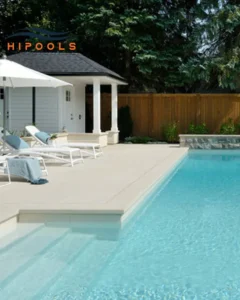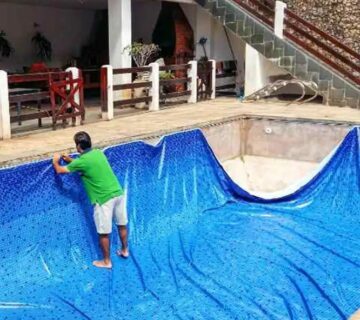A pool site inspection is the crucial first step in bringing your pool installation up to safe, efficient, and code compliant. Before starting any pool construction project, it’s essential to determine the suitability of the land on which the pool is going to be installed. A professional site inspection uncovers potential issues such as soil conditions, drainage problems, and access limitations that could cause delays or extra costs later on.
It also ensures that your pool meets all local building codes and safety regulations, making the process smoother and more cost effective. In this guide, we’ll explore the importance of pool site inspections and why they are essential for a successful pool installation.
Why Pool Site Inspections Are Crucial for a Successful Pool Installation
Before commencing a pool construction project, one of the most important first steps is to conduct a complete pool site inspection. Careful inspection is done to uncover any issues with the land so that the land will be prepared for the installation of a pool and the entire process will be seamless. Without an inspection, there could be hidden obstacles resulting in costly delays, safety hazards, or even future structural issues. This is how pool site inspections can ensure a stress free and glitch-free pool installation.
- Assessing Land Suitability for Pool Construction
One of the most important aspects of the pool site inspection is determining the quality of the soil, the terrain, and general land conditions. The examiner will determine if the ground is stable enough to hold a pool’s structure. Soil erosion, water drainage, and slope of the land are some factors that can greatly influence the stability of the pool in the long run. Poor drainage or low-quality soil can cause the pool to shift, crack, or develop structural issues in the future. By pointing out such issues at this point, you can carry out corrective action, such as stabilizing the ground or improving drainage, before excavation can be undertaken.
2. Ensuring Compliance with Local Building Codes and Regulations
Every city and county has its own building codes and zoning ordinances that govern pool installation. A professional pool site inspection ensures your project is in compliance with them so that you don’t have to deal with permit delays or expensive fines. The inspector will determine whether the intended pool location is in compliance with requirements for things like setback distances from property lines, depth limitations, and safety measures such as fences and gates. It is not only legally important to follow these codes, but also for the well-being of your family and neighbors. An inspection will make sure that your pool installation is code-worthy and in total compliance with local authorities.
3. Identifying Potential Excavation Challenges
Excavation is quite possibly the most critical stage of pool construction, and it usually proves to be the most challenging. During a pool site inspection, the inspector will look for any obstructions to excavation, such as tree roots, large rocks, or underground utilities like gas lines, water pipes, or electrical cables. Discovery of these obstacles ahead of time can prevent unnecessary delays and additional cost. If something is wrong, the plan for excavation or design can be adjusted to ensure that the project can proceed.
4. Evaluating Site Accessibility for Equipment and Materials

The site must be properly accessible for on-time delivery of construction equipment and materials. Under inspection, the inspector will check whether the site is capable of housing large construction equipment, such as excavators, cranes, and heavy trucks for heavy material like concrete and steel. Poor access may cause delays or cost escalation if equipment cannot be readily delivered to the site. The inspector could recommend changes such as increasing opening points or clearing obstructions to facilitate smooth movement of equipment and materials throughout the course of construction.
Read on for more information about Pool Shade Ideas: 8 Ways to Cover Your Swimming Pool
5. Confirming Site Readiness for Construction
Once the inspection is completed, it will determine whether the site is properly ready for construction. This involves verifying that all the required excavation work has been accomplished, the site is appropriately graded, and all necessary utilities like water and electricity are in place. A construction-ready site will allow the process to begin without a hitch, reducing the risk of unexpected delays during the installation of the pool.
Why a Pool Site Inspection is Key to a Successful Pool Installation in Georgia
A pool site inspection is a very important stage of the pool construction process to ensure that your pool project starts on the correct note. Without an inspection, problems arise during installing your pool, leading to time-consuming delays, safety hazards, and surprise issues. Find out why it is vital to carry out a proper pool site inspection to make your pool installation safe, efficient, and compliant in Georgia.
- Assessing the Land’s Suitability for Pool Construction
One of the first things an inspector examines is the land suitability for the installation of a pool. The ground, slope, and soil have plenty to say regarding whether the site is stable enough to support a pool. Unstable ground conditions, such as loose, sandy soil or drainage problems, can lead to issues down the line, such as pool shifting, cracks, or sinking. A thorough site inspection will assess the land to determine if any adjustments like soil reinforcement or grading are needed to make the land pool-ready. If you’re building a pool in Georgia’s diverse climate, this is even more important, as soil conditions can vary greatly by region.
- Ensuring Compliance with Local Building Codes
All pool installation projects in Georgia have to meet local building codes and zoning regulations. Site inspection will confirm that your pool design meets rules governing setbacks from property lines, pool depth, and mandatory safety features like fencing and gates. Adhering to these laws is necessary to secure the required permits and for the pool construction to meet safety standards. A pool site inspection assists in evading fines and delays in construction that result when the project violates Georgia-specific local regulations.
- Identifying Excavation Challenges Before Construction Begins
Excavation contributes significantly to the installation of pools, and a pool site inspection is able to identify potential roadblocks which could complicate this process. Tree roots, subterranean utilities, and massive rocks can get in the way of excavation and increase expenses. Finding these types of problems ahead of time allows for modifications in the design or excavation plan before they cause delays and unexpected costs. Proper identification of the obstacles facilitates the digging process to be as smooth as possible, particularly in certain parts of Georgia where giant rocks or undulating terrain could be common.
- Ensuring Proper Accessibility for Equipment and Materials
Accessibility of the site is essential to the free flow of construction equipment and materials. The inspection assesses whether the site is accessible to excavators, dump trucks, and other heavy machinery utilized in the installation process of the pool. Inaccessibility translates to delays in the delivery of materials or equipment, hence inhibiting the entire project. The inspector may recommend increasing entry points or removing obstructions to ensure timely and effective construction, especially important in Georgia, where some properties may have limited access roads or unique topography.
- Confirming Site Readiness for Pool Construction
Once the pool site inspection is completed, the inspector will check whether the ground is prepared for construction. This includes ensuring that excavation has been performed, the ground is well graded, and necessary utilities like electricity and plumbing are present. Being prepared allows the construction crew to start work immediately without needless delays and issues. Good grading and drainage are particularly crucial in the humid Georgia climate to assist in eliminating future water issues.
A pool site inspection is instrumental to the success of your pool installation project in Georgia. It ensures that your land is buildable, complies with the law, is free from any hindrances, and is accessible for materials and equipment. By addressing any issues before the commencement of the project, you can have an efficient and successful pool installation that is safe to all standards and within your budget.
The Importance of Pool Site Inspections for Safe Pool Installation
A pool site inspection is essential in providing a seamless pool installation in Georgia. It matters in identifying any likely problems at the onset and preventing expensive delays, safety violations, and danger of fines. The inspection assures your site is suitable for construction and free from regulatory shortcomings, thus assuring a seamless flow of the entire process.
Then, inspection ensures terrain and soil quality so the ground will support the pool. Conditions like sandy or loose soils, for instance, could mean that future cracking or shifting becomes a problem. It also tests drainage so that there isn’t a collection of water on the poolside that causes the pool to develop damage over the long term.
The inspection gives you the assurance that your pool is in accordance with Georgia’s local building codes and zoning code requirements such as pool depth, setbacks, and safety features. This helps you obtain permits and avoid fines.
The inspection also identifies excavation complexities such as underground utility lines or large boulders that can affect construction. Finally, the inspection gives assurance for adjacent site access of heavy materials and equipment to prevent production downtime.
Essentially, a pool site inspection in Georgia is the foundation of a quiet, safe, and economical pool installation.

Why is a pool site inspection necessary?
A site inspection is needed to establish possible issues in advance, such as bad soil conditions, drainage issues, or delays in construction due to obstructions. It avoids future issues like pool settling, cracking, and makes certain the pool complies with Georgia’s building codes.
How does a pool site inspection help with drainage?
The inspector inspects the drainage system to ensure water flows away from the pool area. Proper drainage prevents water from standing, which can cause structural issues and damage to the pool over time.
What does the inspection look at in terms of soil?
The test for soil quality, stability, and suitability to support the pool structure is conducted. The test identifies if the soil is loose, sandy, or erosive, thus causing the problems of shifting or cracking.
Key Benefits of Pool Site Inspections for Pool Installation in Georgia
A pool site inspection offers many crucial benefits to your pool installation in Georgia. It prevents future issues such as pool settling, cracking, or water damage by establishing problems with land suitability, drainage, and ground condition before construction. Early detection leads to timely corrections, which are time- and cost-saving during the installation process.
Furthermore, the inspection confirms that your pool is installed based on Georgia’s pool installation codes to ensure that your pool’s safety features, such as fencing and pool depth, are up to standards. Not only does this avoid fines but also ensures safety in your pool area.
Proper site analysis extends the life of your pool by eliminating potential drainage or soil issues, so the construction will last and function for several years to come. Furthermore, having a proper assessment makes the actual construction process less challenging, with minimal disruptions and the site fully prepared for excavation. This results in effective and efficient installation of your pool.
How can I schedule a pool site inspection in Georgia?
You can contact Hipoolss to schedule a professional pool site inspection in Georgia. We offer free estimates and will help you assess your site for a smooth, efficient pool installation.
Will the inspection affect the overall cost of the project?
Even though the inspection adds extra in the beginning, it guarantees problems are caught early enough to prevent expensive repairs or delays later. Ultimately, it saves you money by having your pool installation proceed more smoothly and with fewer issues.
Ensure a Smooth Pool Installation with a Professional Site Inspection
A pool site inspection is essential to a successful installation, preparing your land to be ready and compliant with Georgia regulations. It detects problems like poor soil or drainage problems early on, preventing costly delays.
For an easy pool project, trust Hipoolss to provide a free estimate of your pool site inspection. Our experts will help you start on the right foot and ensure your pool gets built safely and efficiently. Book your inspection with us today and take the first step to your dream pool!




No comment